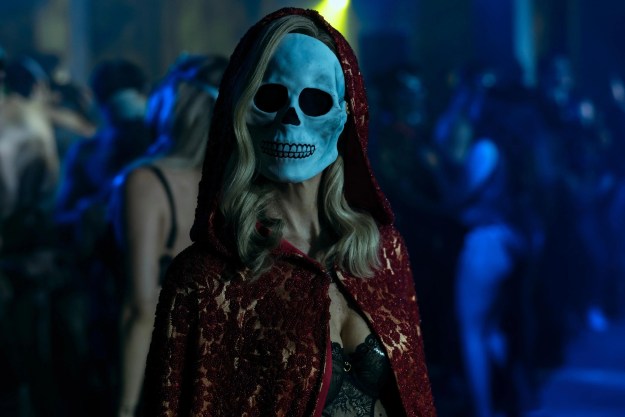
“The Fall of the House of Usher is a grisly, deliciously venomous horror drama from filmmaker Mike Flanagan.”
- Bruce Greenwood and Carla Gugino's tour de force lead performances
- Mike Flanagan and Michael Fimognari's composed, confident direction
- Numerous genuinely horrifying deaths and jump scares
- A few overly sentimental moments
- An episodic structure that gets repetitive in the show's second half
When it was originally announced that writer-director Mike Flanagan’s fifth Netflix series would be based on the works of Edgar Allan Poe, few could have predicted that the resulting show would be a gruesome, gothic take on the modern-day horrors of the Sackler Family and the opioid epidemic. Nonetheless, that’s exactly what The Fall of the House of Usher is. Lest anyone think otherwise, the eight-episode limited series, which was partly written and directed by Flanagan himself, is just as mean-spirited, acidic, and ruthless as its ideas demand. It is, in fact, the most wholeheartedly cynical piece of horror fiction that Flanagan has had a hand in making.
In honor of its Poe-penned pieces of source material, The Fall of the House of Usher sees Flanagan ditch the straightforward horror tones of Midnight Mass and The Midnight Club in favor of something far madder and more, well, macabre. What that shift produces is a TV series that is visually and narratively blunter than any of the filmmaker’s past Netflix efforts, but no less engaging. As he’s already done with the works of Henry James, Christopher Pike, and Shirley Jackson, Flanagan has created a TV series that not only marries his and his selected inspiration’s styles, but also allows them to shine simultaneously.

Based loosely on a number of Edgar Allan Poe’s short stories and poems, The Fall of the House of Usher focuses on the fictional Usher family. Led by brother-sister duo Roderick (Bruce Greenwood) and Madeline (Mary McDonnell), the Ushers are the powerful dynasty behind a corrupt pharmaceutical company that is believed to be responsible for the deaths and drug addictions of millions of Americans. However, after spending decades enjoying the invulnerability provided to them by their wealth, weaknesses begin to form in the Ushers’ armor when Roderick’s children start dying under increasingly mysterious circumstances.
As Roderick begins to question whether some of his past decisions are to blame for his family’s sudden twists of fate, he and his loved ones find themselves tormented by Verna (Carla Gugino), a mysterious stranger who has a habit of showing up just before one of them dies. Before long, the Ushers’ numbers have dwindled and Roderick has been driven to confess his numerous crimes to his longtime rival, C. Auguste Dupin (Carl Lumbly), a well-intentioned district attorney. If that seems like a spoiler, it’s not. Roderick’s midnight conversation with Dupin actually begins within the first few minutes of The Fall of the House of Usher, and it serves as the springboard that leads to the rest of the show’s story, most of which plays out in the past.
As far as narrative devices go, using Roderick’s confession as the foundation for the series’ ongoing voice-over narration and flashbacks is undeniably contrived, but it also has a basis in its namesake Poe story. What’s less defensible is the repetitive nature of The Fall of the House of Usher‘s episodes, nearly all of which follow the same set of plot beats. Each focuses on one of Roderick’s children and uses a Poe short story as the inspiration for their eventual demise. Several of their deaths produce sequences that are among the bloodiest and grisliest that Flanagan has ever made. By the time the fifth and sixth of Roderick’s heirs have found themselves facing their own fates, though, the impact of their deaths has been lessened slightly by The Fall of the House of Usher’s unerring commitment to its own episodic formula.

While its narrative and structural flaws drag down the show’s later episodes, the potency of its gothic mood and the vibrancy of its Giallo-esque aesthetic are never diminished. Stylistically, The Fall of the House of Usher never attempts anything as directorially bold as the one-take episode of The Haunting of Hill House, but Flanagan and fellow director Michael Fimognari do deliver a series that is not only visually cohesive, but continuously bold in its violence and unearthly imagery. The show is, with the exception of The Haunting of Bly Manor, the most aesthetically experimental and striking of Flanagan’s Netflix titles.
Behind the scenes, Flanagan continues his now-famous commitment to his ever-growing stable of actors by using The Fall of the House of Usher as an excuse to reunite with an impressive number of his past collaborators. Not all of them fit in as well as others. Midnight Club stars like Ruth Codd, Igby Rigney, and Aya Furukawa feel out of place in a show that is largely concerned with ideas and themes more well-suited to its older characters, though Doctor Sleep star Kyliegh Curran turns in impressively vulnerable, quietly principled work as Lenore, Roderick’s granddaughter. Elsewhere, recurring Flanagan players like Henry Thomas, Kate Siegel, T’Nia Miller, Rahul Kohli, and Samantha Sloyan give reliably strong and, in some cases, deliciously over-the-top performances as Roderick’s adult children.
Ultimately, though, The Fall of the House is Usher is anchored by the tour de force performances given by Greenwood and Gugino. The former, who was brought on as a last-minute replacement, makes the role of Roderick totally his — chewing up and spitting out every single line Flanagan gives him until it becomes impossible to imagine anyone else saying them. Never before has Greenwood been allowed to bring as much gravitas and Machiavellian energy to a role, and it’s been many years since the actor has felt quite as revelatory. The same holds true for Gugino, who turns in a career-best performance as Verna, a sultry, mischievous supernatural entity that seems to regard the Usher family with equal amounts of both contempt and wonder.

The series is different from Flanagan’s previous Netflix shows in numerous ways, but none more noteworthy than how coolly it presents its characters. Although Flanagan proves himself incapable of fully shaking his own sentimental streak in the Fall of the House of Usher finale, the director regards his latest batch of characters with a level of disdain that is decidedly rare for him. That aspect of the series allows Flanagan to turn it into not only his most scathingly political project to date, but also his meanest and most cutthroat. The show isn’t quite as scary as The Haunting of Hill House, but it is gorier, bloodier, and generally more perverse than the director’s fans may expect.
That doesn’t make The Fall of the House of Usher a disappointing or odd conclusion to Flanagan’s long-running collaboration with Netflix, either. As a matter of fact, quite the opposite is true. By parting ways with the streaming service when he has, Flanagan has ensured that his six-year horror rave hasn’t ended with a timid nod or silent goodbye, but one final flick of the knife and a sudden, rapturous downpour of blood.
The Fall of the House of Usher is streaming now on Netflix.
Editors' Recommendations
- House of Ninjas is Netflix’s newest hit action show. Here’s why you should watch it
- 3 great Netflix shows you need to watch on New Year’s Day
- Like Fall of the House of Usher? Then watch these 5 TV shows that are just like it
- 3 Edgar Allan Poe horror movies to watch after Netflix’s Fall of the House of Usher
- Painkiller meets horror in The Fall of the House of Usher trailer




